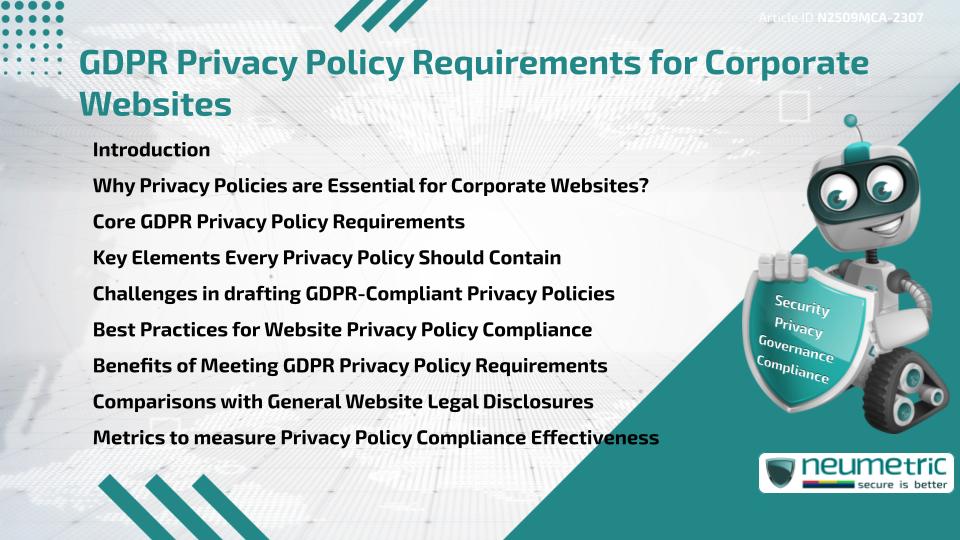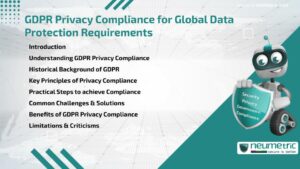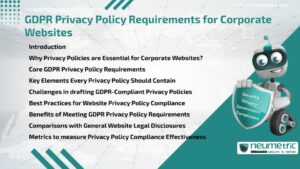Table of Contents
ToggleIntroduction
GDPR Privacy Policy requirements are critical for Organisations operating Corporate Websites that collect or process Personal Data from European Union [EU] Residents. Under the General Data Protection Regulation [GDPR], Companies must clearly communicate how they handle Personal Information, from collection & use to storage & deletion. A compliant Privacy Policy not only avoids Regulatory Penalties but also builds Trust with Customers, Employees & Partners.
Why Privacy Policies are Essential for Corporate Websites?
Corporate Websites frequently collect Personal Data through Forms, Cookies, Analytics & Customer accounts. Without GDPR Privacy Policy requirements in place, Businesses Risk fines, Reputational harm & loss of Customer Confidence. A Transparent Privacy Policy ensures visitors understand their Rights & how their data is being handled. Guidance is available at the European Commission GDPR site.
Core GDPR Privacy Policy Requirements
The GDPR Privacy Policy requirements mandate that Websites must:
- Use clear & plain language to explain Data Practices.
- Disclose the identity & contact details of the Data Controller.
- Outline the purposes of Data Collection & Processing.
- Specify the Legal basis for Processing activities.
- Inform Users of their Rights, including access, rectification & erasure.
- State how long data will be retained.
- List Third Parties or International Transfers where relevant.
- Provide contact details of the Data Protection Officer [DPO], if applicable.
Key Elements Every Privacy Policy Should Contain
An effective Privacy Policy must include:
- Categories of Data collected: Such as: Contact details, Browsing behaviour.
- Data Subject Rights: Explanation of Rights to withdraw Consent, Portability & Complaints.
- Security Safeguards: Overview of measures to protect Data.
- Cookies & Tracking Tools: Details on how Cookies are used & managed.
- Complaints Process: Steps for raising issues with Supervisory Authorities.
These elements ensure Compliance & build Transparency.
Challenges in drafting GDPR-Compliant Privacy Policies
Common challenges include:
- Balancing Legal obligations with clear, User-friendly language.
- Updating Policies to reflect changes in Data Collection practices.
- Coordinating across Legal, IT & Marketing Teams.
- Ensuring Policies are accessible & visible on Websites.
- Adapting Global Policies to meet both EU & Non-EU requirements.
These difficulties often lead to inconsistencies if Policies are not regularly reviewed.
Best Practices for Website Privacy Policy Compliance
To meet GDPR Privacy Policy requirements effectively, organisations should:
- Place the Privacy Policy prominently on the Website.
- Regularly review & update content to reflect changes in practices or Law.
- Use layered approaches, with summaries & detailed sections for clarity.
- Include Cookie Management Tools & Opt-in Consent mechanisms.
- Train Staff to ensure practices align with the Published Policy.
Practical implementation tips are available at ISACA.
Benefits of Meeting GDPR Privacy Policy Requirements
Compliance delivers several advantages:
- Reduced Risk of Regulatory Penalties.
- Enhanced Trust with Customers & Stakeholders.
- Stronger Accountability & Governance practices.
- Clearer communication of User Rights & Responsibilities.
- Improved Brand reputation as a Transparent & Privacy-conscious Organisation.
Comparisons with General Website Legal Disclosures
Unlike generic Terms of Service or Cookie notices, GDPR Privacy Policy requirements focus specifically on Personal Data Protection. While both are necessary, Privacy Policies must provide far greater detail & Transparency to meet EU standards.
Metrics to measure Privacy Policy Compliance Effectiveness
Organisations can track Compliance effectiveness using metrics such as:
- Frequency of Policy updates.
- Percentage of User complaints resolved through Policy clarity.
- Regulator or Auditor feedback on Published Policies.
- Visibility & accessibility of the Policy on the Website.
- User engagement with Cookie & Consent options.
Takeaways
- Ensures Corporate Websites comply with GDPR Legal requirements.
- Provides Transparency in how Personal Data is collected & processed.
- Protects User Rights through clear Communication & accessible Policies.
- Reduces Risks of Fines, Penalties & Reputational damage.
- Enhances Stakeholder Trust & Accountability.
- Strengthens Governance & Audit readiness.
- Improves Brand credibility as a Privacy-conscious organisation.
FAQ
What are GDPR Privacy Policy requirements?
They are obligations for Corporate Websites to disclose how Personal Data is collected, processed, stored & protected under GDPR.
Who must comply with these requirements?
Any Organisation with a Website accessible to EU Residents that collects or processes Personal Data must comply.
What Information must a GDPR Privacy Policy include?
It must include Controller identity, Purpose of Data use, Legal basis, User Rights, Retention periods & Safeguards.
How often should Privacy Policies be updated?
They should be reviewed annually or whenever Data practices or Regulations change.
Do GDPR rules apply to Non-EU Companies?
Yes, any Business targeting or collecting data from EU Residents must comply.
How should a Privacy Policy be displayed on a Website?
It should be clearly visible, usually linked in the footer & during data collection processes.
Can a single Privacy Policy serve Global Operations?
Yes, but it must be tailored to reflect GDPR requirements alongside Local Laws.
Need help for Security, Privacy, Governance & VAPT?
Neumetric provides organisations the necessary help to achieve their Cybersecurity, Compliance, Governance, Privacy, Certifications & Pentesting needs.
Organisations & Businesses, specifically those which provide SaaS & AI Solutions in the Fintech, BFSI & other regulated sectors, usually need a Cybersecurity Partner for meeting & maintaining the ongoing Security & Privacy needs & requirements of their Enterprise Clients & Privacy conscious Customers.
SOC 2, ISO 27001, ISO 42001, NIST, HIPAA, HECVAT, EU GDPR are some of the Frameworks that are served by Fusion – a SaaS, multimodular, multitenant, centralised, automated, Cybersecurity & Compliance Management system.
Neumetric also provides Expert Services for technical security which covers VAPT for Web Applications, APIs, iOS & Android Mobile Apps, Security Testing for AWS & other Cloud Environments & Cloud Infrastructure & other similar scopes.
Reach out to us by Email or filling out the Contact Form…





